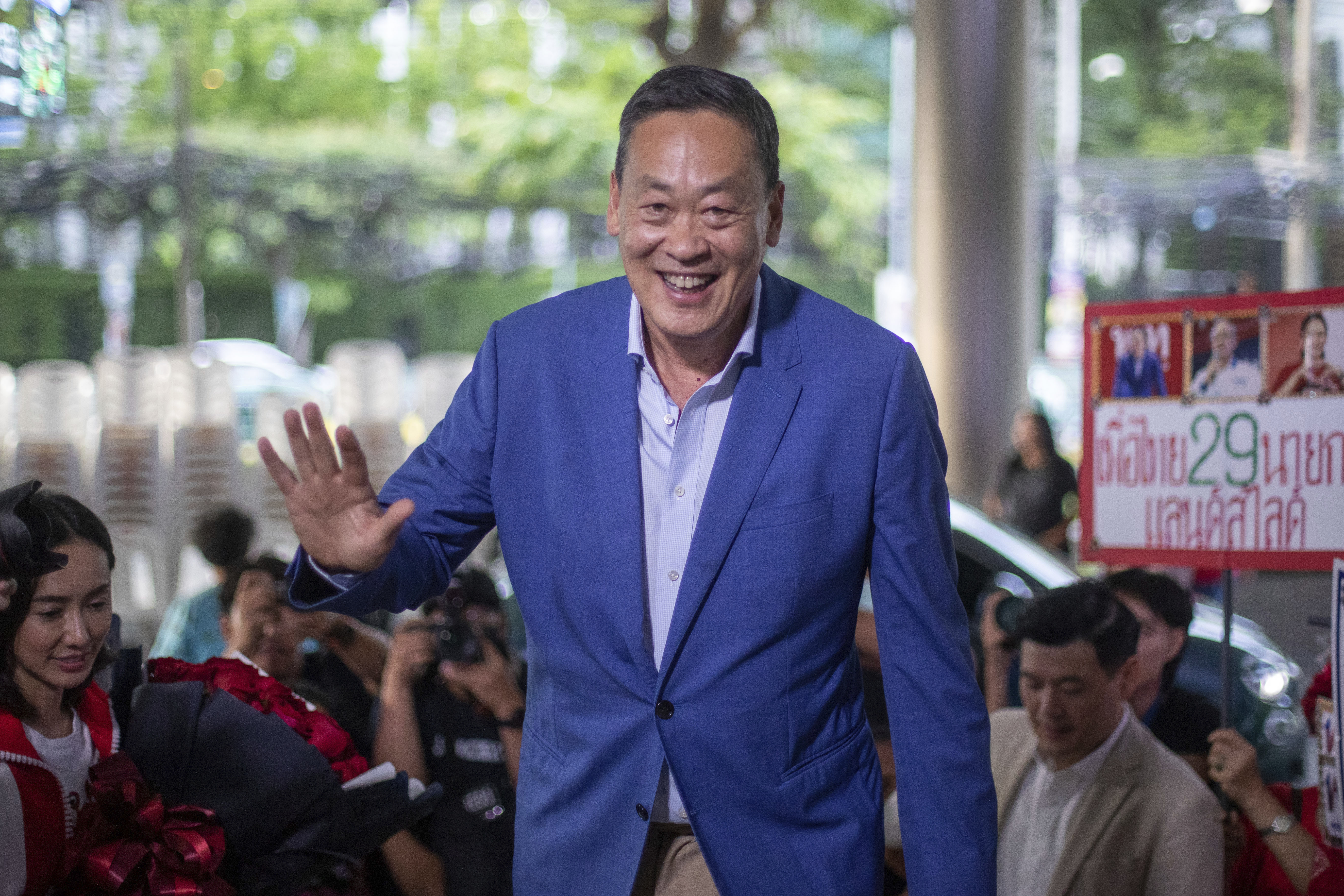
Thailand’s parliament is set to choose a new prime minister after three months of political deadlock, with a real-estate tycoon backed by a grouping that includes several pro-military parties contesting the vote.
Srettha Thavisin of the populist Pheu Thai party will be the sole candidate to face the vote in Thailand’s bicameral legislature on Tuesday.
Pheu Thai came second in Thailand’s May 14 election but took over the formation of a government after conservative members of the unelected upper house blocked attempts by Move Forward – the youth-led progressive party that won the most seats in the polls – from securing the top job for their candidate. The conservative legislators opposed Move Forward because of its pledge to revise a law that shields Thailand’s monarchy from criticism.
Pheu Thai – which announced an 11-party grouping that includes its former military rivals, including that of former army chief and outgoing Prime Minister Prayuth Chan-ocha – said it is confident that Srettha will win Tuesday’s vote.
The 60-year-old political newcomer has the backing of 314 legislators in the lower house but needs an additional 58 votes to secure the job.
So, who is Srettha?
Born in 1963, Srettha has a bachelor’s degree in civil engineering from Bangkok’s Chulalongkorn University and a master’s of business administration from the Claremont Graduate School in the United States.
Srettha, who is 1.91 metres (6 feet, 3 inches) tall and an avid football fan, began his career as an assistant manager at the multinational Procter & Gamble in Thailand before joining Sansiri, his family’s property development business.
He served as the president and chief executive of the company, which currently has a value of about $880m on the Thai stock market, until he stepped down in April of this year ahead of the election.
A confidant of self-exiled billionaire and former Prime Minister Thaksin Shinawatra, whose family founded Pheu Thai, Srettha is well-liked in the business community, with some 66 percent of 100 CEOs surveyed by the Krungthep Turakij newspaper saying he was their preferred choice for prime minister.
Following his political debut, Srettha told Voice of America (VOA), a United States-based news outlet, that it was the despair he felt for Thailand that led him into politics.
“We, you, look around yourself when you’re sitting at the top of the pyramid, you don’t just look at the same levels. You look at below of how other people live,” he said in April. “I feel saddened by what I have seen. Because of social disparity, in terms of education, in terms of getting healthcare, in terms of basic things like getting food on the table, it’s still not the way it’s supposed to be for a country that has enormous potential like Thailand.”
‘Cares about human rights’
Srettha campaigned on promises of economic stimulus, social justice and good governance. He told Bloomberg Television in April that his priorities during the first 100 days in government would be tackling rising costs of living, ending mandatory military conscription, ensuring marriage equality for same-sex couples and drafting a new constitution that represents the will of the people.
During the campaign, he introduced Pheu Thai’s flagship policy of offering 10,000 Baht ($295) handouts via digital wallets for those aged 16 and above to spend in their communities.
He also said Pheu Thai “cares about human rights” and that nine years of military-backed rule in the country had led to a flight of high-skilled Thais from the country.
“People are leaving to take their skill set somewhere they can live with more freedom to express themselves. The right to choose, freedom from conscription, LGBTQ rights – those are just as important as economic stimulus,” he was quoted as saying by the Thai Enquirer website in May.
Days ahead of the election, he told VOA that he would decline the prime minister post if his party has to form a coalition with the parties of Prayuth and his deputy Prawit Wongsuwon. Prayuth led the 2014 military coup against the Pheu Thai government of Yingluck Shinawatra, Thaksin’s sister.
“I don’t believe in military coups,” he said. “The idea of me working with them in the same government, sitting in the same cabinet… I can’t see myself doing that.”
Now, with Pheu Thai announcing an alliance with Prayuth and Prawit’s parties, Srettha told reporters on Monday that the three months of political deadlock in Thailand had made “it necessary to forget what we said”.
He said he was saddened by public criticism over the party’s decision.
“But we are living in reality. Many people are waiting for the government and for the policies of the party, which cannot be implemented without a government led by Pheu Thai.”







